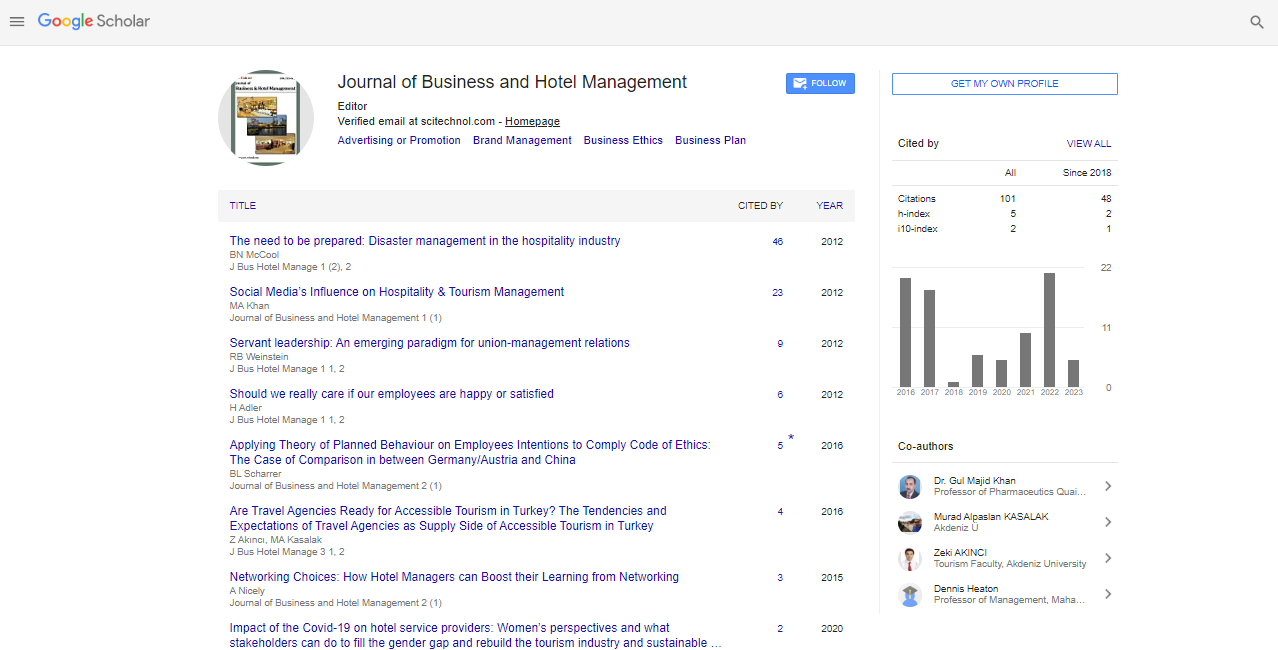Short Communication, J Bhm Vol: 9 Issue: 2
Business Ethics: Building Trust and Sustainability in the Corporate World
Kieu Trang*
Department of Hospitality and Tourism Management, Sejong University, Seoul, South Korea
*Corresponding Author: Kieu Trang
Department of Hospitality and Tourism
Management, Sejong University, Seoul, South Korea
E-mail: trangk48@gmail.com
Received date: 15 May, 2023, Manuscript No. JBHM-23-107999;
Editor assigned date: 17 May, 2023, PreQC No. JBHM-23-107999 (PQ);
Reviewed date: 31 May, 2023, QC No. JBHM-23-107999;
Revised date: 08 June, 2023, Manuscript No. JBHM-23-107999 (R);
Published date: 16 June, 2023, DOI: 10.4172/2324-9129.1000142
Citation: Trang K (2023) Business Ethics: Building Trust and Sustainability in the Corporate World. J BHM 9:2.
Description
Business ethics is a fundamental aspect of conducting business responsibly and ethically. It encompasses the principles, values, and standards that guide the behavior of individuals and organizations within the corporate world. Ethical business practices are essential not only for maintaining a positive reputation and fostering trust with stakeholders but also for promoting long-term sustainability and success.
The importance of ethical decision making
In today's interconnected global economy, businesses operate in an environment that demands ethical decision-making. Unethical practices can lead to severe consequences, including legal issues, reputational damage, and financial losses [1]. Ethical decision-making involves considering the impact of choices on various stakeholders, such as customers, employees, investors, communities, and the environment [2].
Building a culture of ethics
Developing a strong ethical culture starts from the top-down. Company leaders and executives play an essential role in setting the ethical tone and promoting ethical behavior within the organization [3]. They must lead by example, aligning their actions with the company's ethical principles and holding themselves accountable for their decisions [4].
Transparency and accountability
Transparency is a key component of business ethics. Organizations should be open and honest about their practices, financial reporting, and product/service quality. Furthermore, establishing mechanisms for accountability ensures that individuals are held responsible for their actions, reinforcing the commitment to ethical behavior [5].
Fair treatment of employees
Employees are the backbone of any business, and treating them fairly and with respect is vital for fostering a positive work environment [6]. Ethical considerations in employment practices include fair wages, safe working conditions, equal opportunities, and a focus on diversity and inclusion [7].
Responsible marketing and advertising
Ethical marketing involves avoiding deceptive or manipulative practices that mislead consumers. Businesses should provide accurate information about their products and services, avoiding false claims or exaggerations that could harm consumers' trust [8].
Environmental responsibility
As concerns about climate change and environmental degradation increase, businesses must adopt sustainable practices. Reducing waste, promoting energy efficiency, and embracing eco-friendly initiatives not only benefit the environment but can also attract environmentallyconscious consumers and investors [9].
Ethical supply chain management
Maintaining an ethical supply chain is becoming increasingly important. Businesses must ensure that their suppliers adhere to ethical standards in terms of labor practices, human rights, and environmental impact [10]. Ethical sourcing can help prevent issues like child labor, unfair wages, and unsafe working conditions.
Dealing with ethical dilemmas
In the course of business operations, organizations may encounter ethical dilemmas that require careful consideration. Establishing clear ethical guidelines and offering ethics training can help employees navigate these challenges and make principled decisions.
Conclusion
Business ethics is not just a moral obligation but a strategic imperative for long-term success. Companies that prioritize ethics in their operations build trust with customers, attract top talent, and enjoy sustained growth. By upholding ethical standards and promoting responsible behavior, businesses can contribute to a more sustainable and equitable global economy.
References
- Aaker DA (1992) The value of brand equity. J Bus Strategy 13: 27-32.
- Urde M, Koch C (2014) Market and brand-oriented schools of positioning. J Prod Brand Manag 23: 478-490.
- Luisa M, Mariangela F, Pierluigi NI (2004) Market research for requirements analysis using linguistic tools. Requirements Eng 9: 40-56.
- Nunan D, Domenico DM (2013) Market research and the ethics of big data. Int J Mark Res 55: 505-520.
- Srivastava M, Kamdar RM (2009) Brand image formation as a function of involvement and familiarity. Paradigm 13: 84-90.
- Ha HY, Perks H (2005) Effects of consumer perceptions of brand experience on the web: Brand familiarity, satisfaction and brand trust. J Consum Behav 4: 438-452.
- Lai CS, Chiu CJ, Yang CF (2010) The effects of corporate social responsibility on brand performance: The mediating effect of industrial brand equity and corporate reputation. J Bus Ethics 95: 457-469.
- Sen S, Du S, Bhattacharya CB (2016) Corporate social responsibility: A consumer psychology perspective. Curr Opin Psychol 10: 70-75.
- Kuenzel S, Halliday SV (2008) Investigating antecedents and consequences of brand identification. J Prod Brand Manag 17: 293-304.
- Bettis RA, Hitt MA (1995) The new competitive landscape. J Strateg Manag 16: 7-19.
